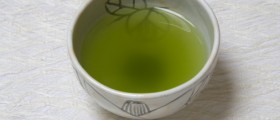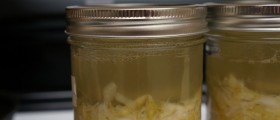
Parsley is a species of Petroselinum in the family Apiaceae. This herb is native to central Mediterranean region, but today widely cultivated as a herb, spice and a vegetable. This bright green biennial plant forms a rosette of tripinnate leaves 10–25 cm long with numerous 1–3 cm leaflets, during the first year. In the second year it grows a flowering stem up to 75 cm tall with sparser leaves and yellow to yellowish-green flowers. Curly leaf parsley is often used as a garnish, but it is also used on many foods as a topping and one of the spices. Parsley also contains many health benefits of which are especially derived from parsley tea.
Preparation of parsley tea
Parsley tea is best made from fresh parsley. Dried commercially available parsley provides slightly less health benefits. To make a herbal mixture suitable for tea, one should chop fresh parsley and allow it to dry naturally. For one single cup of parsley tea, one will need approximately one-quarter cup of chopped parsley. Parsley tea is prepared by pouring boiling water over chopped parsley and letting it steep for approximately five minutes. Parsley tea is a bit bitter, especially if steeped longer than five minutes. To make it less bold one can steep it a little less or use one-eightth of a cup of chopped parsley to make a cup of tea. To provide sweeter taste, one should use organic honey as a sweetener. Health benefits of parsley tea
Almost every part of parsley plant can be used in medical purposes. This includes the seeds, the root and the leaves. Parsley is especially rich in iron, vitamin A, vitamin B and vitamin C. Moreover, parsley contains trace minerals. This refreshing and healthy drink is an easy way to obtain essential nutrients.
High levels of vitamin C, found in parsley, provide humans with protection against inflammatory polyarthritis, a form of rheumatoid arthritis involving two or more joints.
Moreover, the activity of parsley's volatile oils provides protection against particular types of carcinogens.
Parsley tea is rich in flavonoids, which may prevent oxygen-based damage to the cells and prevent many diseases. Vitamin C found in parsley tea is another traditional antioxidant and a powerful anti-inflammatory agent. Like vitamin C, beta-carotene may also be helpful in reducing the severity of asthma, osteoarthritis and rheumatoid arthritis.
Parsley tea is also a diuretic, effective against water retention and beneficial for weight loss. It promotes the optimal functioning of the digestive system and excretion of toxins and waste from the body.

















Your thoughts on this
Loading...